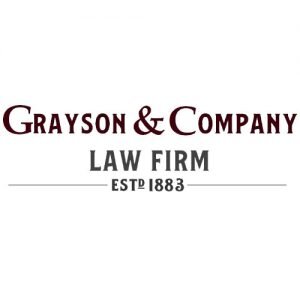Best Marriage Lawyers in Moose Jaw
Share your needs with us, get contacted by law firms.
Free. Takes 2 min.
Free Guide to Hiring a Family Lawyer
List of the best lawyers in Moose Jaw, Canada
About Marriage Law in Moose Jaw, Canada
Marriage law in Moose Jaw, Saskatchewan, is governed by both provincial legislation and federal law under the Marriage Act (Saskatchewan) and the federal Marriage Act of Canada. Getting married legally requires fulfilling certain criteria, obtaining proper documentation, and following processes for both civil and religious ceremonies. Moose Jaw follows the same marriage procedures as the rest of Saskatchewan, but understanding local offices and resources can make the process smoother for residents and visitors alike.
Why You May Need a Lawyer
While many marriages proceed without legal complications, some situations call for the advice or representation of a lawyer. Common reasons to consult a lawyer regarding marriage in Moose Jaw include:
- Obtaining legal clarity on prenuptial or cohabitation agreements
- Navigating complex family situations, such as previous marriages or children from earlier relationships
- Addressing concerns about property, asset protection, or debt in marriage
- Ensuring compliance with documentation for international marriages or immigration matters
- Seeking advice during disputes or annulment proceedings
- Interpreting the rights of common-law partners versus legally married spouses
- Understanding legal implications in cases of religious or cultural marriage practices
Local Laws Overview
In Moose Jaw, marriage is regulated by the Saskatchewan Marriage Act and the federal Marriage Act. Key aspects of marriage laws in Moose Jaw include:
- Marriage Licenses: Applicants must obtain a marriage license from an authorized issuer in Saskatchewan. Licenses are valid for three months from the date of issue.
- Minimum Age: Both parties must be at least 18 years old. Individuals aged 16 or 17 may marry with parental consent.
- Capacity to Marry: Both individuals must be unmarried at the time of the marriage ceremony. Divorcees must provide proof of the dissolved marriage.
- Ceremony: The ceremony can be civil or religious and must be performed by an authorized officiant.
- Witnesses: Two witnesses must be present at the ceremony.
- Solemnization: Certain cultural or religious ceremonies must still meet legal standards to be recognized under Saskatchewan law.
- Registration: After the ceremony, the marriage must be registered with eHealth Saskatchewan to be legally recognized.
Frequently Asked Questions
What documents are required to get married in Moose Jaw?
You will need government-issued photo identification (such as a driver's license or passport) for both parties. If you were previously married, you must provide an original or certified copy of your divorce certificate or your late spouse's death certificate.
How do I get a marriage license in Moose Jaw?
Marriage licenses can be obtained from authorized registries or marriage license issuers in Moose Jaw. Both parties must apply in person.
Can same-sex couples marry in Moose Jaw?
Yes, same-sex marriage has been legal across Canada since 2005, and Moose Jaw fully recognizes same-sex marriages.
Is a prenuptial agreement required?
No, a prenuptial (or premarital) agreement is not required for marriage. However, it may be advisable to protect assets or clarify expectations.
Is there a waiting period after getting a marriage license?
There is no waiting period in Saskatchewan; you may marry as soon as you have your marriage license. Licenses are valid for three months.
Who can be a witness at my marriage ceremony?
Witnesses must be at least 18 years old and able to understand what is taking place. They do not need to be relatives.
What are the legal requirements for the marriage ceremony?
The ceremony must be performed by an authorized officiant in the presence of at least two witnesses and must include a verbal exchange of consent.
How do I obtain a marriage certificate after the wedding?
You may request an official marriage certificate from eHealth Saskatchewan once your marriage has been registered.
Can I get married in Moose Jaw if I’m not a Canadian citizen?
Yes, non-residents and visitors can marry in Moose Jaw provided they meet all legal requirements and can provide necessary identification and documents.
What happens if I lose my marriage certificate?
You can apply for a replacement certificate through eHealth Saskatchewan, providing appropriate identification and information about your marriage.
Additional Resources
If you need further information or assistance regarding marriage in Moose Jaw, the following resources may be helpful:
- eHealth Saskatchewan: Handles marriage registration and certificates
- Vital Statistics Office: Provides marriage licenses and related services
- Moose Jaw City Hall: Information on local marriage commissioners and civil ceremony arrangements
- Saskatchewan Ministry of Justice: Oversees family law including marriage, divorce, and prenuptial agreements
- Law Society of Saskatchewan: Find qualified local lawyers specializing in family and marriage law
Next Steps
If you require legal assistance regarding marriage in Moose Jaw, consider the following steps:
- Identify your specific needs-whether it's for a prenuptial agreement, understanding legal requirements, or resolving a legal dispute.
- Gather all relevant documents including identification, proof of previous divorce (if applicable), and any agreements you wish to discuss.
- Contact a qualified family lawyer in Moose Jaw for tailored legal advice and representation
- Use local resources like the Law Society of Saskatchewan to find reputable professionals.
- If your concern is administrative (e.g., obtaining a marriage license or certificate), reach out to eHealth Saskatchewan or your nearest marriage license issuer for direct support.
Understanding marriage law can seem daunting, but local professionals and resources are available to help ensure your marriage is legally recognized and protected in Moose Jaw.
Lawzana helps you find the best lawyers and law firms in Moose Jaw through a curated and pre-screened list of qualified legal professionals. Our platform offers rankings and detailed profiles of attorneys and law firms, allowing you to compare based on practice areas, including Marriage, experience, and client feedback.
Each profile includes a description of the firm's areas of practice, client reviews, team members and partners, year of establishment, spoken languages, office locations, contact information, social media presence, and any published articles or resources. Most firms on our platform speak English and are experienced in both local and international legal matters.
Get a quote from top-rated law firms in Moose Jaw, Canada — quickly, securely, and without unnecessary hassle.
Disclaimer:
The information provided on this page is for general informational purposes only and does not constitute legal advice. While we strive to ensure the accuracy and relevance of the content, legal information may change over time, and interpretations of the law can vary. You should always consult with a qualified legal professional for advice specific to your situation.
We disclaim all liability for actions taken or not taken based on the content of this page. If you believe any information is incorrect or outdated, please contact us, and we will review and update it where appropriate.









